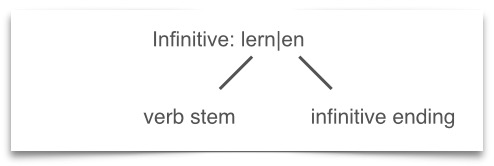Learning German Grammar – TENSES:
Present Tense
The present tense is the most simple and also the most important tense when learning German grammar. It is not only used to express what you are doing at any particular moment, but also to express things that you regularly do and even things that will happen at some time in the future! As you can see, the present tense is a very important tense. Below you will learn more about the use of the present tense, but first I will explain how to form sentences in the present tense.
Here is how you build sentences with the present tense in German

Here is an example of the regular verb „lernen“ (to learn):

As you can see in the diagram above, the infinitive is formed form a so-called “present-stem” (in this example: lern-) and the infinitive-ending (-en).
If you want to use a verb in the present tense, you must conjugate the verb. “Conjugate” is a technical grammar term; it simply means that you must exchange the infinitive ending (-en) with one of six endings. The particular ending that you use is determined by the subject of the sentence. Depending on the subject, the verb will take one of six endings; three of these are in the singular and three are in the plural.
Singular
1st. person: The subject is always the personal pronoun “ich”(I). The verb ending for the first person is “-e”: therefore “Ich lerne Deutsch” (I learn German.).
2nd. person: The subject is always the personal pronoun “du”. The verb ending for the second person is “-st”: therefore “Du lernst Deutsch” (You learn German.).
3rd. person: The subject can be one of these personal pronouns; “er” (he) is the masculine form, “sie” (she) is the feminine form and “es” (it) is the neutral form. In the third person singular, any noun in the singular can also be used: “Mein Freund” (my friend), “Paul”, “der Stuhl” (the chair) and so on. The verb ending for the third person is “-t”: therefore “Paul lernt Deutsch” (Paul learns German.).
Plural
1st. person: The subject is always the personal pronoun “wir” (we). The verb ending for the first person is “-en”: therefor “Wir lernen Deutsch” (We learn German.).
2nd. person: The subject is always the personal pronoun “ihr” (you). The verb ending for the second person is “-t”: therefore “Ihr lernt Deutsch” (You learn German.).
3rd. person: The subject can be one of the personal pronouns “sie” (they) or “Sie” (polite form). In the third person plural, any noun in its plural form can also be used: “Meine Freunde” (my friends), “Paul und Anna”, “die Stühle” (the chairs) and so on. The verb ending for the third person is „-en“: therefore “Paul und Anna lernen Deutsch.” (Paul and Anna learn German.)
As you can see, if you are learning German and want to form sentences in the present tense, you have to learn these six verb endings: -e, -st, -t, -en, -t, -en.
Cheese! At this point you might be a little worried that it’s all too complicated. But there’s no need to panic! In the following video I will show you a fantastic learning technique, which will make it easy to learn these conjugated verb endings.
Learning techniques for learning conjugated verb endings/ Endings for German verbs in the present tense
The use of the present tense
As I previously mentioned, the present tense has many uses. Primarily, you can use it in these three different ways:
1. To say what you are doing at any particular moment.
Was machst du gerade? (What’re you doing at the moment?) Ich esse eine Pizza.(I’m eating a pizza). Ich lese ein Buch. (I’m reading a book), and so on…
2. To express things that you regularly do.
Ich fahre jeden Tag mit dem Bus zur Schule. (I go by bus to school every day). Ich gehe einmal pro Woche zum Training.(Once a week I go to training). Ich fahre jedes Jahr zweimal in Urlaub. (I go on holiday twice a year), and so on …
3. Speaking about the future.
No, your eyes don’t deceive you! When we are speaking in German about the future, we primarily use the present tense and only in exceptions do we use the future tense. Here are some examples:
Heute Abend gehe ich ins Kino. (This afternoon I am going to the cinema). Morgen treffe ich mich mit Freunden. (Tomorrow I am meeting up with friends). Nächste Woche habe ich eine Prüfung. (Next week I have a test). Nächstes Jahr ziehe ich aus meiner Wohnung aus. (Next year I will move out of my apartment). In zehn Jahren höre ich auf zu arbeiten. (In ten years I will stop working), and so on …
From this you can see that it doesn’t make a difference whether you’re talking about an event in the near future (tomorrow, next week, etc.) or an event that will occur in the distant future (in ten years or even longer).
In general we use the present tense, when we are speaking about the future.
We usually use the future tense when we make predictions or when we want to emphasize what will happen in the future. For example: Morgen wird es voraussichtlich regnen (Tomorrow it will probably rain). In tausend Jahren wird es keine Menschen mehr geben. (In a thousand years there will be no more people). Bald werde ich ein Produkt zum deutschen Satzbau entwickeln. (Soon I will develop a product about German sentence construction), and so on …
If you have enjoyed this page about the present tense in German and you want to learn more useful learning techniques, I would recommend my Crash Course on Mnemonics for German Grammar.
Learning aids for German grammar
If you really want to learn German grammar, I would like to recommend you to use creative learning aids for German as a foreign language. In my FREE Video-Course "German Grammar for your Brain".






